Archiving the Culture. Interview with SoundMag
As researchers deeply invested in the popular culture of sound systems and other SST, we are well-aware that these are ongoing scenes established long before we arrived. Each specific SST operates within an existing ecology, that has developed usually across decades and below the radar of official or academic recognition.
The knowledge that is produced within these scenes and the way it is treasured, shared and passed on is one of the primary areas of interest for the SST project. As an embodied, local and empirical knowledge, it is traditionally shared through reasoning or apprenticeships, a process which makes these grassroots cultures almost self-sufficient.
Occasionally, the need for a more systematic way of archiving this knowledge may arise. Practitioners or enthusiast-run platforms (blogs, fanzines or websites) provide an important angle to approach SST. As on-going archives, they consolidate the existing knowledge. As media entities, they make the scene accessible to the outside world. By doing so, they build their own infrastructure whose capacities SST is keen to support and amplify.
SoundMag (www.soundmag.club) is a young UK-based printed magazine devoted to sound system culture and dub music, currently releasing its fifth printed issue. We have reached out to the editor-in-chief Jack Young and his colleague Jack Fittes to know more about the ethos behind the project, how their background in sound system has influenced their media practice, as well as to get a picture of their journey so far.
—
Hi Jack, could you please introduce yourself?
(JY) I’m Jack Young, founder & creative director of SoundMag. I have had a passion for sound system culture since discovering it at 15, and ten years later I’m still as passionate, but now with my sound system, magazine, and a lot more knowledge. I am based in Leeds.
Which kind of articles is it possible to find in SoundMag and what’s the focus?
(JY) SoundMag is devoted to cover the dub and roots sound system culture worldwide. In each issue there are Q&As with sound system operators, builders, dub producers, record labels. Anyone who contributes in any way to the culture, we are interested to hear their story. There are stories on legendary artists, nights, festivals and more. We have informative articles on how to build sound systems or improve acoustics. We want to hear the diverse stories of sound system activists around the world.
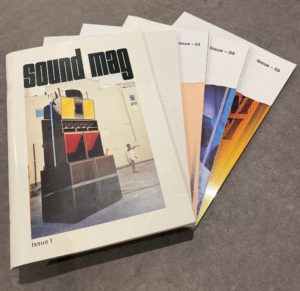
The five published issues
Could you tell us a bit of the story and the idea behind the project?
(JY) Dave Price and I created SoundMag shortly after meeting. At the time we felt like nothing was documenting the sound system scene, especially in the UK. We knew people loved attending dub sessions, yet knew nothing about the culture, its people, the history and the politics. Our aim was to create a gateway for a generation of people interested in this culture but without the resources to find out more. Creating opportunities for people who wish to be involved results in a sustainable culture.
Dave now focuses on his new project Tracks Magazine, whilst Jack Fittes has joined the team bringing his journalism experience and education to tame SoundMag to the next step. Our objective remains the same. Making sound system culture more accessible and promoting it to a wider audience.
I know you (Jack Young) have a sound system background. Could you tell us a bit more about that?
(JY) I started as a boxman for Iration Steppas. As far as apprenticeships goes, I’m not sure I could have been any luckier with being part of this sound. Naturally, after five years I gained the knowledge to start my own sound system with Akash Parekh and Peter Youll. So now I am a selector and sound system operator of Rebel Spirit Sound System and promote the night Run the Dub, both based in Leeds.
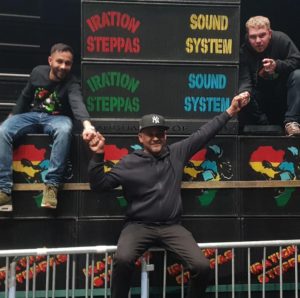
Jack Young with part of Iration Steppas crew
How has your practitioner experience influenced the way SoundMag has been conceived?
(JY) I believe it has pushed the depth of knowledge involved in each magazine. The extent of what you are trying to present will always be limited to the extent of your knowledge. As a practitioner, I have access to information that most people won’t have. Also, I can easily spot misinformation in what we are publishing, and be able to dig deeper into interesting topics which may not be common knowledge.
While you (Jack Fittes) have a background in journalism. Why did you choose to offer your skills to the sound system scene?
(JF) About four years ago I decided to give writing a try and reviewed a festival called Wonderfruit in Thailand. I pinged the article around and it eventually found its way to Data Transmission, who I have been writing for ever since. During Covid I decided I was really going to gun for life as a journalist and completed a masters degree in magazine journalism at Cardiff. All the writers and professors and visiting lecturers kept saying be niche and write what you know, so I followed their advice and here we are.
Sound system is what I know. I won’t pretend to be super technical or even particularly well connected, but I just love it with all of my soul. It would be criminal to be this invested in something and not get involved. Sound system sessions are my own personal form of healing, I let a lot go on that dance floor and come out lighter every time. I feel like I owe it something and this is my way of giving back.
Can you give us a glimpse of the journey so far?
(JY) The first issue was entirely Dave Price and myself. We didn’t expect it to be a big thing. We originally printed 50 copies to sell on the local scene, and when we went to the pub to package them up, we had sold them all before we finished our first pint. All gone and worldwide.
Since then it has become more professional. The potential was realised and we accept help when it is offered. Mark Iration (Iration Steppas), Cheff (Sinai sound system), Rico (OBF sound system) have been a few of our biggest advocates. The latest issue (#5, just published) features 135 pages and it has been printed in a thousand copies. People reach out to us to stock the magazine in their country to help the awareness. There’s volunteers to help with content. It makes me proud of what we have started.
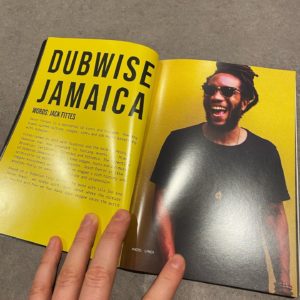
Featured interview from issue #5, just published
Besides Jamaica, the UK is undoubtedly the country with the longest history and richest culture when it comes to reggae sound systems, and it has been pivotal in the global spread of the culture lately. This knowledge is usually preserved as oral memories and passed on through apprenticeship, and it is rarely systematized and archived in a way that is easily accessible. In this sense, how can a platform like SoundMag benefit the scene?
I believe it’s becoming increasingly dependent on platforms like SoundMag. Social media for a long time has replaced the absence of people reasoning, and sound system apprenticeships are happening less. Unfortunately, those who are more vocal on social media are usually wrong, and so if that becomes your source of knowledge, then it is very easy to take on misinformation. I learnt this early on when I repeated false knowledge in the apprenticeship environment and I was quickly corrected.
Platforms like ours provide structure to knowledge sharing that cannot be speculated carelessly without being held accountable – which is why it is reliable. I would recommend the apprenticeship route and reasoning with others, particularly elders to any aspiring sound system practitioner though, as the tricks of the trade you learn are priceless. It’s just unfortunate this opportunity is rare.
What has been the feedback that you have received from the scene so far, from the UK and from abroad?
Overwhelming support. The number of messages we receive from people who just want to share how much they love their magazine is crazy. We have some people who have bought everyone and like to give us their feedback each time which is cool because it feels like I’m sharing this journey with so many more people. Of course, when it started, we would mainly sell to just the UK and then one or two from different countries around the world, but now there are just as many people buying from Europe, America, and countries I previously didn’t know how to spell.
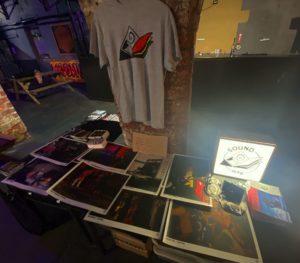
SoundMag stall out to a dance
SoundMag is not only a web platform but also a beautifully printed magazine. How much is this real-world presence important in the overall project and why?
I think similarly as you will find people want vinyl because it’s physical and can be held, they want magazines as it’s there for them to pick up and read, or share. It’s your own copy of culture that will stay with you forever and which you can collect. Everyone says that print is dead, but there are 101 online blogs all doing the same thing, so by creating a physical product that looks nice, we stand out, and people feel more invested in what we do.
As a UK based sound system practitioner and activist, what is your view on scenes outside of the UK?
As a practitioner abroad, I have only experienced sound system culture in western Europe. My view of western Europe’s role, particularly in France and Spain is that they lead an example on how to conduct business and promotion. On the other hand, I would say that given it is still relatively young, it isn’t quite as rich culturally or musically yet, however, this is from a UK perspective, and this might be a similar view that you could expect from Jamaica about the UK scene. The music and its culture evolve with each new region it steps into. In terms of music style, 90s UK steppas is of course an example of how the UK did this from the Jamaican origins, and to France’s credit, the Original Dub Gathering record label is a more recent example. We are now starting to see it grow massively in the Americas, particularly Brazil and Mexico and this is really interesting.
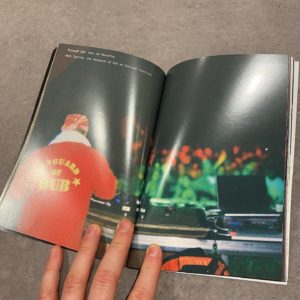
Iration Steppas pictured on issue #5
How is SoundMag currently funded? What is the business model you have developed and the work ethics the magazine sticks to?
Originally, I funded it myself with my engineering job income. The lockdown period allowed me to make a lot of preparations putting together a shop selling merchandise and other bits to make the model more sustainable. The project now funds itself and I dedicate all my free time after work to the project, with the help of volunteers which I am really grateful for.
I always make sure those who volunteer towards a magazine whether it is through photography, design, conducting an interview or being interviewed themselves, that they receive a copy of the magazine. I hope by expanding the shop and creating revenue that I can soon apply myself, Jack Fittes and anyone who wants the opportunity to the project full time.
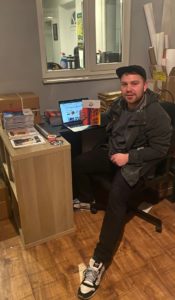
SoundMag’s office
What are the future plans for SoundMag?
The addition of Jack Fittes to the team has really given the magazine a lot of direction and we continue improving the magazine in size, quality, and content. We are going to start offering our skills as a branding and design service to the sound system world. We are now taking part in more events with pop-up shops, selling our magazines, print, clothes and much more. Bigger events may be the next goal with innovative ideas.
How to access SoundMag online, and how to put one’s hands on the printed version?
We have a dub blog on our website www.soundmag.club which is full of bitesize content. You can also access digital copies of our old magazines if you become a member for just £25 a year and this also guarantees you every new printed magazine which is automatically sent out to you when released. The printed version is also available on our site and in many book and record stores from around the world. If you would like to support your local store, simply send us a message and we will be happy to tell you if there is any in your country who stock the magazine.
